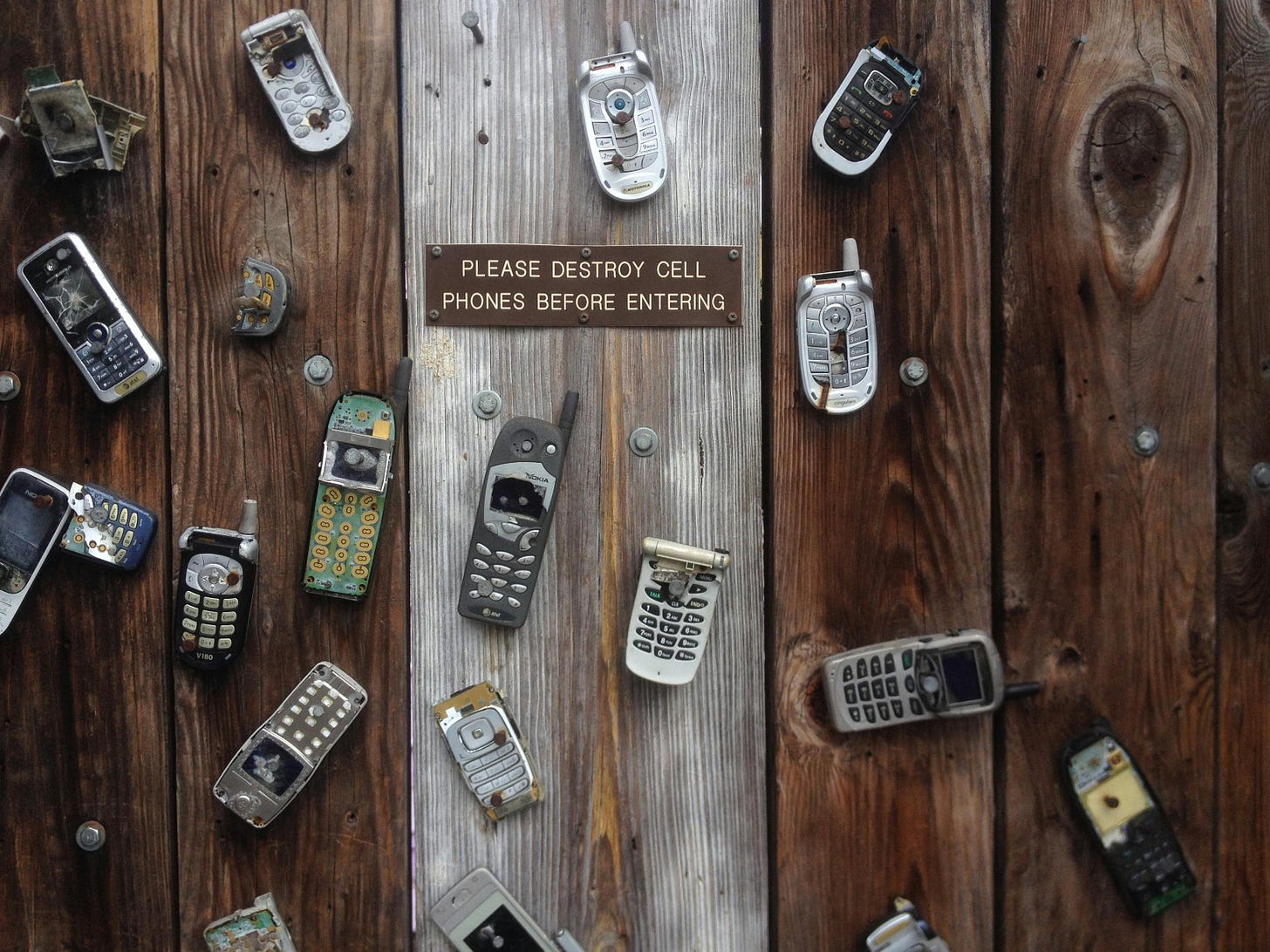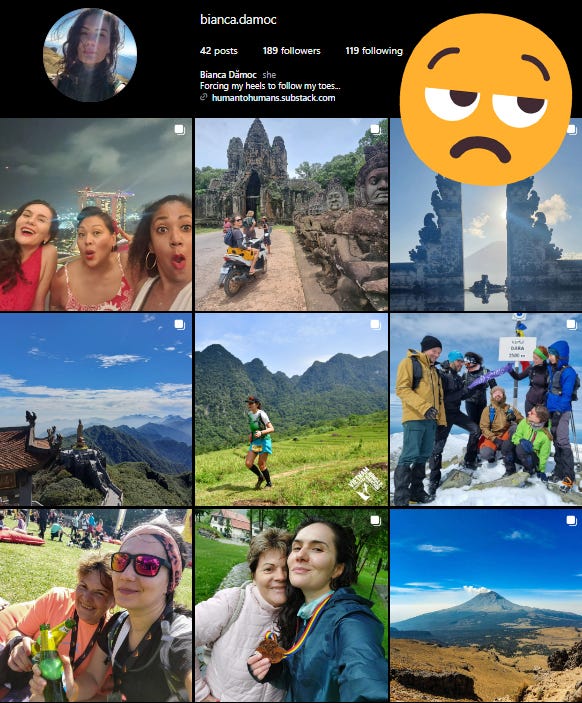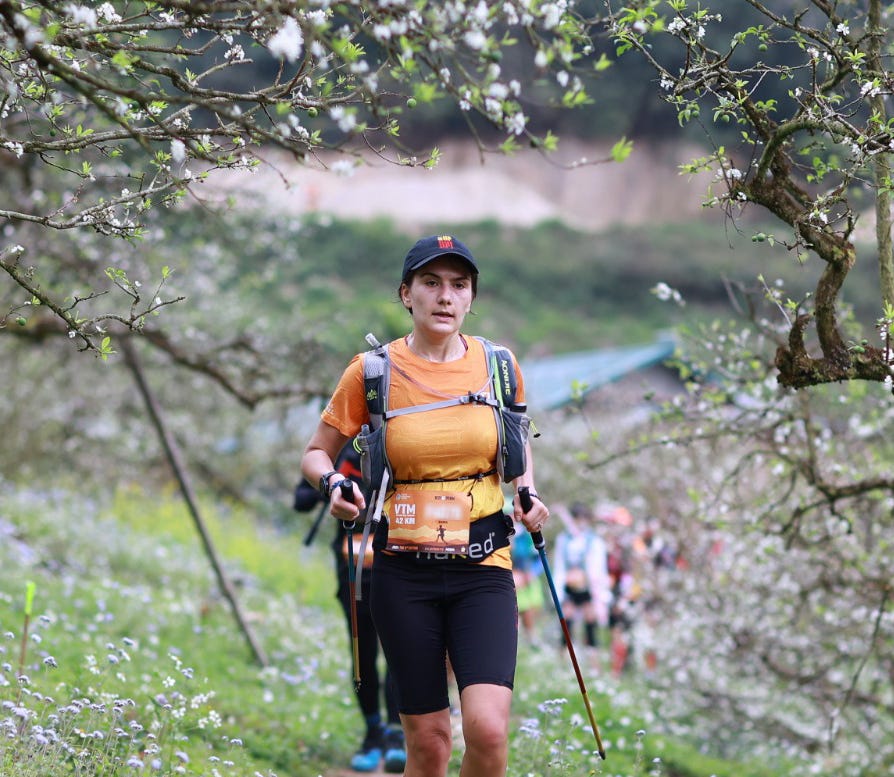Hey Facebook! It's not me, it's you...
and Instagram, and TikTok, and Reddit, and Linkedin
This letter may appear cut because of the photos in your inbox, please click “view full message” or read it on the web.
Also, if you have a friend who’s a little too attached to their phone, do them a favor and forward this email/article. Here's to less screen time and more friend time!
-
I grew up in a time when we didn't have opinions about everything, and when we did, those opinions rarely traveled further than a person's own voice.
I've never been the type for social media.
I've never understood why people felt the need to share every unfiltered, personal stream of consciousness on a public platform. Much less sharing photos or videos of themselves.
I also never quite got the appeal behind friending people who weren't my actual friends, or even less, the infatuation with lifestyle "influencers." Why would I take advice from strangers online whose most evident skills seem to be selfie-taking and hashtag-writing?
We all know this is fake, right?
Right?!
It was only at university that I finally felt pressured enough to sign up for Facebook. I needed an online space to share homework with my classmates and complain about our teachers, and Z'berg provided it.
Even so, Facebook was a thing confident to my laptop's browser.
And my laptop was for schooling, not entertaining.
Bear in mind I wasn't some hermit. I was the rule, not the exception.
Only "gamers" chose to sit in front of the screen in their free time, for the rest of us, technology wasn't that interesting or addictive.
Instead of being on social media, we were just being. We were studying, we were going out and occasionally pretended to exercise, it didn't occur to us to be anything else.
I remember being in my early 20s when I finally bought a touchscreen phone (aka a phone with apps). If you existed as more than a teenager in the early 2010s, then you'll probably remember that "back then" access to the internet wasn't as convenient as it is now and phone storage was low.
We used our phones how God intended them to be used - sending texts and taking blurry photos of our cats.
But, we were children of the millennium, ready to embrace it all.
It seems fantastical to think about it now, but a decade ago we didn't upload our digital breadcrumbs on a cloud in the sky, it rested solidly on a chip in our devices.
But as technology evolved, so did our devices, their storage, and the apps that currently fill it.
Eventually, I did get a better phone, one where I needn't worry about storage. And I installed Facebook, Reddit (my favorite,) Instagram (out of a moment of desperation during covid,) and even TikTok (another moment, just as desperate, also during covid.)
And even if my entire life, I've only ever used Facebook for talking with family and old classmates, managing groups, and checking on Meta ads, that blue "f" logo has been ever-present in all 3 of my phones for the past 10 or so years.
That changed a few days ago. But more on that in a moment.
If you don't have a Facebook or Instagram account (congratulations!) then I'll forgive you for missing this piece of news - Meta had a global "outage" this past Tuesday that affected millions of users. They didn't really explain it, and it hasn't really been fully resolved (I think,) but they thank us for our patience and apologize for any inconvenience it may have caused.
During this outage, I was logged out of Facebook and Messenger.
I distinctly remember opening the app, noticing the error, and forgetting why I opened the app in the first place. I didn't even attempt to remember the password. Just closed the app.
A few hours later I tried opening the app, again for no particular reason, presumably thinking I would be magically logged in, and when I saw myself out of the system once more, I saw my chance and I took it...
Facebook was the last social media app on my phone.
What I forgot to tell you (or saved for dramatic purposes) is that over the last 2 years I've slowly been deleting every social media platform from my phone. Not logging off, not deleting my account, simply uninstalling the apps from my mobile device - harmless.
And it's only now, with the help of my wife, that I noticed I had developed a pattern:
I'd get accustomed to an app.
The algorithm would get better at tailoring the content to my persona.
I'd start using it more frequently.
My anxiety would get worse.
I'd be surprised as to why.
I'd finally understand that spending hours on my phone and ingesting rage-y content were the culprits.
I'd uninstall the app cold turkey.
These post-uninstallation days were typically followed by moments of clarity, and feelings of superiority over the plebs that were still on Reddit / Twitter / Instagram / Whathaveyou, AND YET I'd still reach out for my phone out of pure habit and stupidity.
Eventually, and somewhat inevitably, a few days or weeks later, I'd latch on to a different app, loosely at first and then tighter.
And so the cycle continued.
What's interesting is that I rarely participated on these platforms. I didn't share my thoughts or my photos. I didn't like, comment, or subscribe because I felt that being a lurker instead of a contributor somehow made my usage less problematic.
Instagram was the only app I sporadically bestowed with selfies, and ironically, it was also the app I would spend the least of my time on - an hour a week tops. I felt strange every time I would publish a photo for my 189 followers" - "I'm traveling, I look good, I spent 10 minutes deciding what photos to upload, like me." I chose to delete Instagram out of ickiness.
I was on SnapChat for 5 seconds, and Twitter for 10.
LinkedIn felt too obnoxious to have on my phone.
The commentary started feeling unnecessarily hateful, so I uninstalled Reddit two years ago.
I became too addicted and said goodbye to TikTok at some point in 2022, and I finally deleted Instagram in December of 2023 because I forgot to do it sooner.
Facebook - the one social media app I've had on my phone the longest, is also the last one I uninstalled on March 6th, 2024.
I never once announced a digital sabbatical, I didn't turn it into a "thing", and I didn't tell my wife. I didn't delete my account, I didn't put a timer on, I just uninstalled the apps.
I decided I didn't need continuous access to people's thoughts or selfies, I also didn't want those people to have continuous access to mine.
Culture expert, Ted Gioia in his article, The State of Culture, says that the fastest-growing sector of the culture economy is distraction.
It’s a huge business, and will soon be larger than arts and entertainment combined. Everything is getting turned into TikTok—an aptly named platform for a business based on stimuli that must be repeated after only a few ticks of the clock.
TikTok made a fortune with fast-paced scrolling video. And now Facebook—once a place to connect with family and friends—is imitating it.
This is more than just the hot trend of 2024. It can last forever—because it’s based on body chemistry, not fashion or aesthetics.
If you're interested in reading more about how technology overwhelms human weaknesses, particularly through social media and ads you’ll enjoy this article I wrote last month - It's "just an ad" or a plot to hack your brain?
When we discuss risks tied to artificial intelligence we often fear the moment when machines become smarter than us: the moment when they overwhelm human strengths. But there is an earlier moment—one we’ve already passed—when artificial intelligence overwhelms human weaknesses.
When we build technology that overwhelms human weaknesses we open up the risk of new and extremely dangerous forms of exploitation. - Center for Humane Technology
It seems to me that all we've done in this past decade is to relinquish more and more control - first control over our data, then control over our time, now control over our brains.
Let me be clear, the problem is not social media.
I am social. I'm an extrovert, I love connecting with people, whether offline or online - preferably offline.
I also live half a world away from the country I consider home and the people I consider best friends. And not only do I fail miserably at speaking the local language but I live in Vietnam, a country that heavily relies on Facebook for everything - from ordering pizza, to searching for events, to connecting with the embassy.
I'm involved with an expat community where I host social meetups.
I volunteer with a dog shelter a few days a week.
I started a hiking community where we go on monthly hikes.
I started a queer community where I organize regular events.
I'm also training for a triathlon and go on (almost) daily group rides and runs.
My point is.
I love people. I love being around people. I love connecting with others.
I need technology to facilitate all of these interactions, particularly social media.
If you're like me, then you need it too.
If you have a small business, or if you’re a freelancer, then you need it to promote yourself.
If you work in corporate, or if you’re currently a job seeker, then you know just how important LinkedIn is.
I'm not trying to take away from the relevance of social media, I've been working in marketing for over a decade, I know how important it is.
But the problem isn't social media.
The problem is that social media is in your pocket, at all times.
I recognize that life becomes a lot easier when you can just be solidly 100% on one side. Otherwise, things can get messy, you need to start drawing lines - I like this, I don't like this, maybe I can change that. You start repelling people and they start making strawman arguments against you - "I thought you said you hate social media! Hypocrite!"
There is SO much wrong with social media, with how overstimulating it is, with its quick hits of addictive distractions, with its performative pretty words and images that are only meant to increase your status anxiety.
We are in the middle of a societal crisis. Technology is depressing our youth. People are lonely, they don't have close friends, they don't speak to family members, they treat other people like options on a menu.
If social media was actually social, we wouldn't be living through the highest loneliness epidemic.
I deleted social media from my phone because I had reached a point of needing to drown out the noise inside my head with the noise outside of my head until I couldn't listen to my own voice anymore.
It contaminated my thinking. I was losing my excitement for small things and lived in a state of mild dread. But I only really started to worry when I got the sense that I couldn't read through a book's paragraph without the urge to reach for my phone. This cannot be the same brain I was using to read 2 books a week in university.
In her article entitled "It's Obviously the Phones" Magdalene J. Taylor points out that "All but one of the top seven largest companies in the world by market cap are tech giants. [ ... ] I don’t know much about economics, but I’d venture to guess that there is some financial incentive for these companies to keep you on your devices as long as possible."
Well, I know much about marketing and can confirm that indeed, everything is designed to keep you on your devices as long as possible - the notifications, the short bursts of content, the scrolling, the tracking, the self-amplifying feedback loops, the influencers.
I’ve learned about this TikTok influencer the other day, and she tests the durability of lip products while running. That's it, that's the niche. Well, I have lips, and I run, and know many other people with lips that run; not once have I heard anyone talk about the need for lip products while running.
And it could very well be that for the past 5 years, I've only been part of fringe groups that enjoy running with chapped lips OR it could be that influencers are grasping at straws to look different in an over-saturated market. It could be that we've moved away from online education, to entertainment to distraction (to Ted Gioia's point.)
And of course, the problem with bite-sized pieces of content is that nothing is that simple, not even a pancake recipe. You don't understand the context, the only thing you've learned is slogans. - It ain't gone slide down easy if it ain't cheesy!
You're hopefully wondering "How do we fix this."
It is very naive of us to think that the way we use something every day does not shape our thinking, and therefore our life outside of it.
The core of my argument rests on the fact that the problem is not necessarily "social media" as a whole, that is wrong the problem is that we keep social media on our phones and use it as a crutch to fill the voids of our days.
I'm not advocating for deleting your social media accounts, because I don't believe that the only way forward is going backwards to how things used to be, before social media.
I also don't think we should wait for the creators of these apps to make them any less addictive. Even the guy who invented the infinite scroll now regrets it. But his regret doesn't make it go away. We may know better but we keep doing worse because it's profitable.
We seem to believe that things will just level out because they always have. But that's not a guarantee. You have complete agency over how you choose to use your devices.
Uninstall social media from your phone. That's all you have to do.
Have you ever tried watching TikTok videos on a laptop's browser? Without the notifications, the fake intimacy, the scrolling, or the ability to multitask? Please try it. I guarantee you'll be over it in under 10 minutes.
I have put up deliberate barriers to constant distraction that allow me to engage more deeply in my work and social life.
This friction of having to very intentionally sit down, open a browser, and willingly choose to click (not swipe) through TikTok videos. It makes you realize how pointless it is, and how you're using up your limited human time in a way you probably should not.
Any sort of research I need to do on social media, any sort of community organizing, any sort of posts I need to put out there, I do it on my desktop. This separation encourages me to use social media intentionally rather than as a default activity during a spare moment.
And yes, I still occasionally do it. I'll think of trying a new recipe, and go on TikTok to watch recipe trailers. Social media can be efficient, it can be useful, you can still use it if you do it intentionally and wisely.
Alongside all of the apps that I now need to exist - banking, calendar, and emails, the only social communication apps on my phone are WhatsApp, Signal and Zalo.
For any one person to send me a message on any of these apps they would need to have my phone number. If they have my phone number, I'm going to assume we actually know each other, and what they have to say to me matters.
It's also important to note that just because you delete social media from your phone, the habit to reach and grab your phone won't be gone. You'll find yourself going to the icon where TikTok used to be, or Instagram, and then you'll feel ridiculous, you may even think of yourself as an addict, I did.
Every time I reached out for my phone out of habit and not purpose, I'd open WhatsApp and text a friend to see how they were doing. This week alone I had two catch-up calls with friends whose voices I haven't physically heard in months. This is substantially more emotionally rewarding than emptily liking their Instagram posts.
So now I've gone full circle and am back at using my phone how God intended it - texting and taking blurry pictures.
I'm challenging you to delete all social media apps from your phone. Try it for a week and see how you feel.
What's the worst that can happen, miss out on photos from that one friend's trip to Bora Bora? Do you even care?
Who knows, maybe you'll break up with social media too.
Listen Facebook, we need to talk. It's not me, it's you.
What do you think?
How many hours a day are you on social media?
Would you delete it from your phone?
Why? Why not?
Was this worth reading?
Use the heart to let me know ❤️













As much as I enjoyed reading about your experience and understanding your perspective, I too live on the other side of the world and I hang onto facebook for dear life because it's the only thing where my friends from home get to know what i'm doing. yet I rarely post on it, and I complain that my friends don't either, then blame the time difference. Nah man. My friends are not on facebook anymore, so why am I?! I don't want instagram because I am a word person and of course I am not going to spam our whatsapp group with 'status updates'... What's left for me?
I saw myself reflected, especially because I work in marketing and there are days when my life (work and leisure) passes 100% through social media ... and I cant never disconnect. I started making some decisions similar to yours. For example, I don't have Facebook or LinkedIn on my smartphone. I give them a certain use during work hours from the PC. But when I go outside my house, I feel more liberated... maybe I get a message "I sent you a message on LinkedIn..." And to that I can respond "Okay, I'll read it tomorrow."
I felt very identified, greetings!